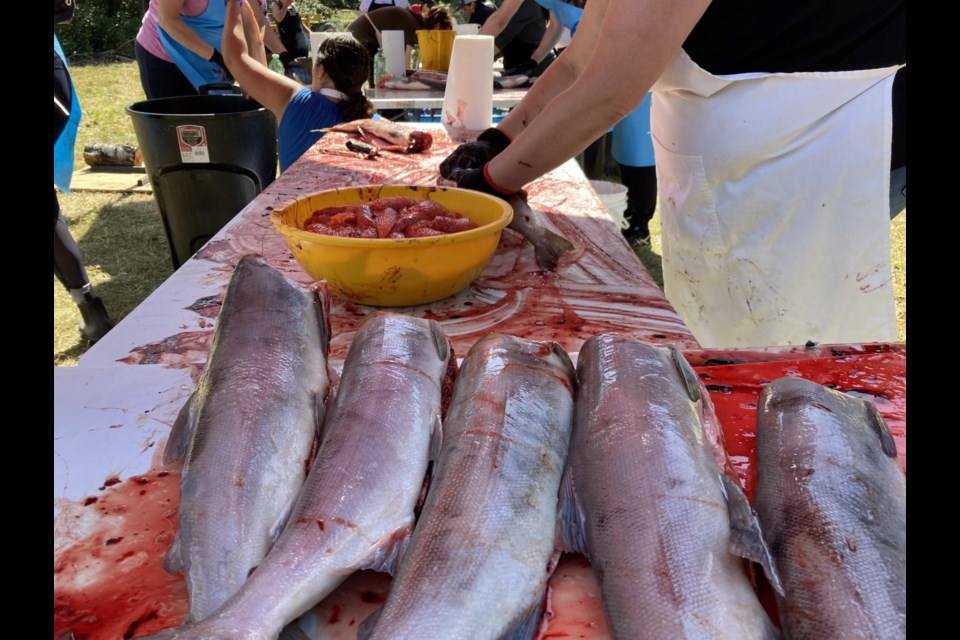It’s never a good idea to give any lip to someone holding a long, sharp knife covered in blood. Best do as they ask.
I was told to build a fire but not with roaring flames. Instead, I was tasked with building a slow-burning blaze with plenty of smoke to shoo away the wasps that wanted to hang around the tables set up to gut hundreds of salmon recently pulled out of Babine Lake. The wasps wanted a free lunch and some of the people with the long knives - one of them my wife Ronda - were getting stung.
Smoke was needed so I went to work.
Ronda is a support services worker with Carrier Sekani Family Services and had gone out with our travel trailer to the fish camp on the Wednesday. When she informed CSFS CEO Warner Adam and Mary Teegee, the executive director of child and family services, that I was coming out on Friday after work, they insisted I come out early to take some pictures, write a story and, most importantly, make myself useful (for a change) by lending a hand.
The fish camp was at the Tachick Lake Resort south of Vanderhoof, on the traditional territory of the Saik’uz First Nation. CSFS bought the resort recently with plans to transform the property and existing buildings into a treatment centre. In the meantime, however, three new smokehouses had been built – and were still being finished – while the camp was underway but all of the salmon wasn’t being smoked. Some of it was being dried, some of it canned and some of it was being frozen.
All that fish had to be gutted and prepped, however, and that’s what was happening when I got out there late Friday morning.
I was encouraged to build the smoky fire with green pine branches. Initially, I had some success, thanks to a nice breeze off the lake giving the fire just enough oxygen to keep it smoky and blowing over the fish workers.
But my efforts weren’t good enough as the afternoon went on. I was pulled away from time for various gopher tasks and I was distracted after lunch by the gorgeous eagle sitting at the top of a lakeside tree, one eye on us, the other surveying the water.
Finally, one of the women had enough of my failure and took over, quickly and efficiently building a perfect smoky fire with branches and dried grass in what seemed like five seconds flat.
I was sent over to help Tracey, CSFS’s senior policy analyst, with some canning. Of course, I wasn’t actually doing anything important. My job was to loosely spin some lids on the glass jars that had already been stuffed with salmon chunks, salt and various spices, load them back into their cardboard cases and take them to the canning cabin.
It was fun to listen to the various conversations, including a long discussion about the various canning methods, which I learned are unique to individual Indigenous communities, the matriarch in charge and family preferences.
Some families like to put curry in their canned salmon, Gavin from Sk’ai Zeh Yah, the CSFS youth centre in Prince George, said his family puts beer and brown sugar to make a sweet salmon concoction. Many take the bones out of the salmon while others like to keep the bones in because the canning process softens them and makes a great source of calcium.
The next morning, I was helping Tracey again because she was making her own personal batch with bone-in salmon and her specific preference of salt and spices that she called the Moricetown way.
I thought my two days of work were long and tiring until I learned some women had been up running the jars through the boiling canning pots into the wee hours of the morning and were right back at it in the morning.
This was joyful work, with plenty of laughs and stories mixed into the communal effort. The salmon – in all its various forms – will be shared with the various communities and CSFS member nations, tasty traditional nourishment that will hopefully be eaten in the same joyful way it was prepared.
It was an honour to be a part of it, I made some great new friends and I hope to do it again.
Mussi cho.

